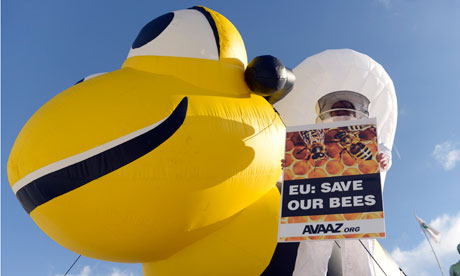Damian Carrington guardian.co.uk, Friday 15 March 2013 12.37 GMT

A member of NGO Avaaz holds a placard next to a giant inflatable bee during a demonstration calling on the EU to adopt a ban on neonicotinoid pesticides. Photograph: Eric Vidal/Reuters
The world's most widely used insecticides, linked to serious harm in bees, will not be banned across Europe. The European commission proposed a two-year suspension after the European Food Safety Authority deemed the use of the neonicotinoids an unacceptable risk, but major nations – including UK and Germany – failed to back the plan in a vote on Friday.
The result leaves environmental campaigners, scientists and some politicians bitterly disappointed. "Britain and Germany have caved in to the industry lobby and refused to ban bee-killing pesticides," said Iain Keith, at campaign group Avaaz. "Today's vote flies in the face of science and public opinion and maintains the disastrous chemical armageddon on bees, which are critical for the future of our food." He said Avaaz and other groups would now consider a legal challenge.
The chemical companies that dominate the billion-dollar neonicotinoid market, Bayer and Syngenta, will be relieved, as will the UK government. Ministers had argued that more scientific evidence was needed and that a ban could have caused disproportionate damage to food production.
Conservationists argued that even greater harm results from the loss of bees and the vital pollination service they provide. Almost three-quarters of the UK public backed the proposed ban, according to a poll released on Wednesday, and Avaaz had amassed 2.5m signatures across Europe in support.
EC officials said: "The commission takes note of the member states' response to its proposal but remains committed to ambitious and proportionate legislative measures."
Suspensions have previously been put in place in France, Germany, Italy and Slovenia, but the EC proposal would have applied across all 27 member states. Friday's vote by member states' experts on the standing committee on the food chain and animal health failed to reach the required majority either in favour or against the suspension.
About three-quarters of global food crops rely on bees and other insects to fertilise their flowers, and so the decline of honeybee colonies due to disease, habitat loss and pesticide harm has prompted serious concern.
A series of high-profile scientific studies in the last year has increasingly linked neonicotinoids to harmful effects in bees, including huge losses in the number of queens produced, and big increases in "disappeared" bees – those that fail to return from foraging trips.
The UK's environment secretary, Owen Paterson, faced criticism from one of his Conservative predecessors. Lord Deben, who as John Gummer was environment secretary, said: "If ever there were an issue where the precautionary principle ought to guide our actions, it is in the use of neonicotinoids. Bees are too important to our crops to continue to take this risk."
Paterson had said in February: "I have asked the EC to wait for the results of our field trials, rather than rushing to a decision." However, the results were not available at Friday's meeting because the field trials have been seriously compromised by contamination from neonicotinoids, the world's most widely used insecticide. Prof Ian Boyd, Defra's chief scientist, said: "At the control site, there were residues of neonicotinoids in pollen and nectar."
Green MEPs across Europe had written to every nation's environment minister, including Paterson. "By spreading uncertainty via apparently 'science-based' arguments, the agrochemical companies are acting as 'merchants of doubt' and are therefore blocking effective action by European policymakers," said the letter.
The EC proposal was to ban the use of three neonicotinoids from use on corn, oil seed rape, apples, carrots, strawberries and many other flowering crops across the continent for two years, after which the situation would have been reviewed.
Evidence submitted to an ongoing parliamentary inquiry in the UK cites a long list of failings in the existing regulation of neonicotinoids. Currently, only the effects on honeybees are considered, despite 90% of pollination being performed by different species, such as solitary or bumblebees, hoverflies, butterflies, moths and others. Another failing is that the regime was set up for pesticide sprays, not systemic chemicals like neonicotinoids that are used to treat seeds and then spread through the growing plant.
Even the National Farmers Union, which argues that there is no need for change, admitted: "It is very well-known that the current pesticide risk assessment systems for bees were not developed to assess systemic pesticides."
Read original article


No comments:
Post a Comment